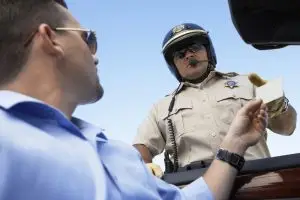
Can you refuse to show your ID to the police in California? California does not have “Stop and Identify” or “Papers Please” laws, so law enforcement cannot legally penalize you for politely refusing to furnish ID in most circumstances.
However, if you are pulled over or arrested, you must provide the officer with an ID. If you refuse, you can face legal penalties. In addition, if you were pulled over for a DUI and failed to show ID, your refusal may be used against you in court.
A Los Angeles DUI lawyer can provide more information about your legal rights.
Can Law Enforcement Officers Demand to See Your ID?
Police officers may sometimes request identification. If they stop you in public or private, you should politely ask if you can leave. If they say yes, we recommend leaving and not showing your ID.
California does not require you to show your ID to overzealous law enforcement officers just because they want to identify you. However, if the police decide to arrest you, you must provide your identification.
Should You Show the Police Your ID?
You are free to provide your ID to the officer if you would like to do so. In some cases, it may expedite your interaction with the officer. If they are looking for someone in particular or need an easy way to show that you belong in a specific location, showing the officer your ID may be sufficient to clear up any confusion.
Know Your Rights If the Police Stop You
The last thing you want is to incriminate yourself unknowingly. Therefore, by remaining calm, polite, and reasonable, you can avoid most issues and refuse most requests from the police. If the police stop you, do your best to:
- Remember that you have the right to remain silent and refuse consent to any searches.
- Always stay calm and polite. Don’t act erratically or aggressively.
- Follow any lawful command given by the police officer.
- Don’t lie or provide false documents or information
We recommend contacting a lawyer for help with any interactions with law enforcement officers.
Police Officers May Still Arrest You
Failing to provide an officer with your ID is not a surefire way to avoid being arrested. If an officer suspects that you have committed a crime, at least to the level of probable cause, your refusal to present an ID when asked will not stop the arrest.
In addition, officers will sometimes mistakenly arrest people for failing to show ID when asked to do so. A criminal defense attorney may help you deal with charges of resisting a peace officer by showing that you faced a wrongful arrest.
Can You Refuse to Show Your ID After Getting Pulled Over?
While an officer who stops you outside a vehicle does not have the right to see your ID, you must show identification when asked after being pulled over. This action ensures you have a license to drive on the road following California Vehicle Code § 12500.
If the police stop you under reasonable suspicion of DUI, the officer may consider your refusal to provide your ID further suspicion of drunk driving. In addition, you can face a misdemeanor charge for refusing to provide your ID on top of any other charges you may face from the stop.
Failing to present a driver’s license can have a significant impact on your life, so make sure you keep your license with you when driving. You can also face charges for driving on a suspended license in California, so check your license before you get behind the wheel.
Can You Refuse to Show Your ID as a Passenger in a Vehicle?
If you are a passenger in a vehicle that the police have stopped, you typically do not have to agree to show your ID if asked. Simply being a passenger in a car at a traffic stop is not enough justification for an officer in California to get your ID.
They may ask for it, and you can decide whether to provide it.
What Happens if You Refuse to Show Your ID After Getting Pulled Over?
If you refuse to show identification to law enforcement after being pulled over, you may face criminal charges for driving without a license. Generally, California treats this as an infraction or a misdemeanor offense, depending on the prosecutor’s decision.
After a lawful arrest, you could face fines of up to $1,000. Additional penalties can include up to six months in jail.
You may also face additional charges if the police think they have reasonable suspicion that you committed another crime, like speeding or drinking and driving. It’s essential to contact a lawyer in Orange County after an arrest.
Can Lawyers Help if You Refuse to Show Your ID?
Hiring a lawyer can help if law enforcement uses refusal to show your ID as a basis for arrest without any additional reasonable suspicion that you engaged in criminal activity. A lawyer can build a defense plan if you face DUI charges or other accusations.
Attorneys understand your constitutional rights and hold the police department accountable for their actions when they make unreasonable demands for identification.
Understand Your Rights Ahead of Time
In California, you have broad rights regarding your interaction with the police. If you know your rights, you can affirmatively assert them if an officer ever stops you, reducing your stress when interacting with the police and even preventing you from unintentionally incriminating yourself.
If you feel that the police have violated your rights, you should know that a lawyer may push to suppress any evidence gathered resulting from that violation. The prosecution should not use evidence gained improperly against you at any criminal trial.
Get Help if You Refuse to Provide Proof of Identification
Can you refuse to show your ID to the police in California? Legally, you can refuse a demand for identification in public or private spaces. However, you may have to obey an identification request after an arrest or if the police stopped you while driving.
You can learn more about legal requests for personal identification by reviewing our resources. You can also call or complete our online contact form to learn more about the issue of identification.






